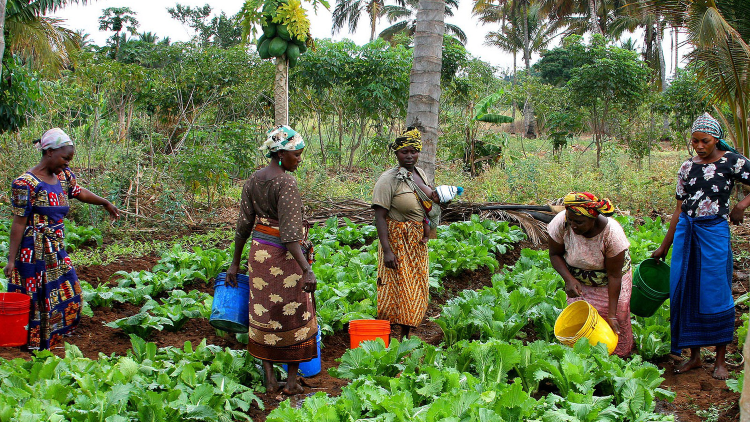
Oxfam's 'Time to Care' report shows global wealth founded on inequality
By Linda Bordoni
A just released report by Oxfam – the international charity which focusses on poverty alleviation - shows that just over 2000 individual billionaires control more money than 60 percent of the world’s poor population combined, and that it is the underpaid or even unpaid work done by the world’s poorest women that generates enormous wealth for the global economy.
The report, released just before the World Economic Forum that takes place in Davos, Switzerland, from 21 to 24 January, also highlights the fact that underpaid and unpaid work by women and girls adds three times more to the global economy each year than the whole technology industry together.
Max Lawson, Oxfam International’s Head of Inequality Policy explained to Linda Bordoni why the report is entitled “Time to Care”.
Lawson says Oxfam’s annual report examines the relationship “between billionaires and the super, super rich people at the top of the global economy, and the people at the bottom, particularly the hundreds of millions of poor women who spend billions of hours a day, in caring for the sick, caring for the elderly, cooking, cleaning…”
Unseen and unrewarded contribution by women
It’s a pun on the word “care”, he says, because “it’s this foundation of unpaid work done by the poorest women that generates enormous wealth for the economy.”
Lawson notes that in the report it is calculated that the combined contribution to the global economy of all this care work done by poor women is worth 10.8 trillion US dollars: that’s three times bigger than the whole tech industry - three times bigger than Google, Facebook, all of them put together.
“It is this unseen and unrewarded contribution by women that creates enormous wealth that is sucked upward into the bank accounts of the richest people and of the billionaires,” he says.
That wealth generated by the world’s poorest women, he explains, “is encapsulated and concentrated in the hands of a tiny number of people who are predominantly men.”
'Billionaire boom'
Lawson expresses his belief that the world would be much better off without the current “billionaire boom” phenomenon.
He says it is increasingly the case that “billionaires are not part of the solution, they are part of the problem, they’re the sign of a sick and broken economy and the world would be a lot better off without them.”
It’s just common sense, Lawson continues, pointing out that “the world would be a lot better if you could take all of that money that is concentrated in the secret Swiss bank accounts of the richest people, and distribute it widely across the world: just imagine what we could do with that money - schools, hospitals, teachers, nurses…. So yes, so we think it is really time to start asking: do we need billionaires? Can we afford billionaires as a global economy? And I certainly think we have far too many billionaires and they are far too rich.”
Asked whether Oxfam’s message will reach the about to begin World Economic Forum in the Swiss resort of Davos, Lawson says he hopes it will as the charity is part of an alliance that has a voice at the Forum.
The solutions for inequality will come from ordinary people
But more than that, he says his hope lies in the protests and in the passion of ordinary people across the world.
“The solution to the inequality crisis across the world will not come from Davos and will never come from billionaires. The solutions will come from ordinary people forcing politicians to listen to them,” he says.
Pope Francis: a strong voice against economic and social inequality
Lawson goes on to highlight Pope Francis’ reiterated call for a transformational change in global economy based on care for our brothers and sisters and on the recognition of the human dignity of the other.
“I think Pope Francis’ voice is deeply relevant,” he says recalling a tweet during a Davos Forum four or five years ago in which he said 'Inequality is the root of social evil'”.
The Pope, he says, has always been very explicit regarding the enormous damage that the gap between rich and poor is doing to humanity, tearing people apart when we should be working together.
And, Lawson continued, in a time in which some of the world’s most influential countries are giving voice to populist trends, to have such a high profile leader speaking out for the poorest and the most vulnerable, and speaking out about the serious inequalities in our economic system, is enormously valuable.
Gender equality and economic equality go hand in hand
Lawson concludes noting that the current economy, that gives an extreme amount of wealth to a tiny group of people at the top is also a deeply sexist economy: “It’s an economy that is built on the backs of women and of poor women and their labour, whether it’s poorly paid labour or even unpaid labour, it is a sexist economy and it’s a broken economy, and you can only fix the gap between the rich and the poor if at the same time you fix the gap between women and men.”
“These two sister struggles are so closely connected. This is the message we want to get across this year: that we fight gender inequality and economic inequality, side by side, step by step, together.”
Thank you for reading our article. You can keep up-to-date by subscribing to our daily newsletter. Just click here







